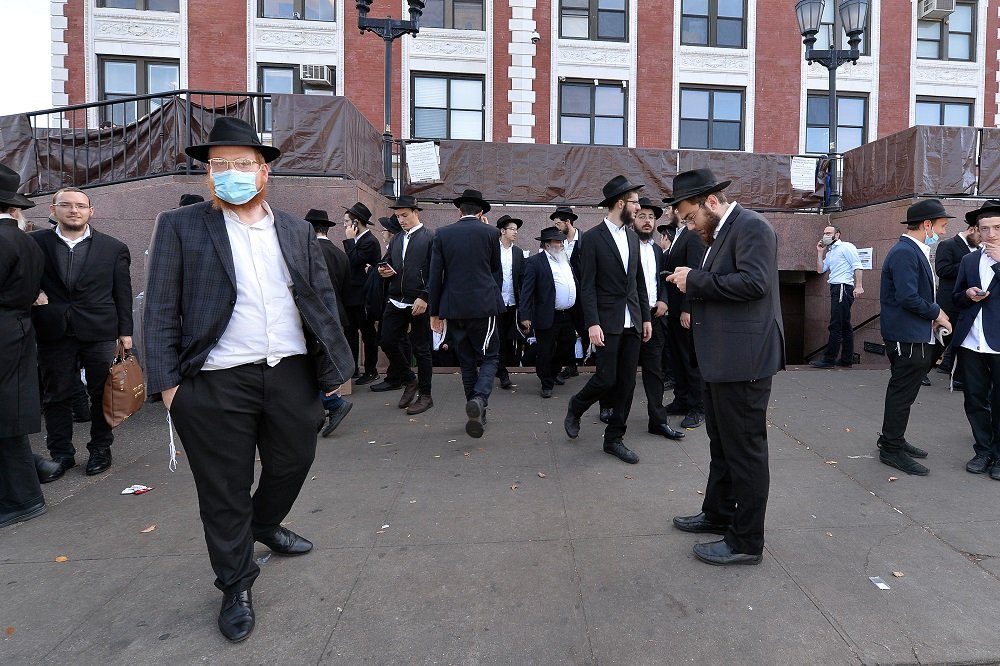
As a professor who has been studying campaigns, elections, and the Jewish community for close to two decades now, it is important to note that as the 2020 election cycle winds down, it will take months to generate a clear picture about how the diverse American polity voted and why. As such, articles with titles “Many Jews of color and diverse Jews are politically conservative — and many voted for Trump” are useful because they highlight the diversity within the American Jewish community, but they are concurrently misleading because data substantiating such a claim (beyond observational work) simply does not exist.
We have no reliable, comprehensive exit poll data on Jews, period. There is no systemic proof of how votes actually broke down in 2020, and these exit polls themselves are incomplete given the large number of absentee and mail-in ballots cast — not to mention the constant re-weighting and re-releasing of the data.
However, we do have a few insights about the American Jewish
community going into the November 2020 elections.
The America Jewish Committee’s annual Survey of American Jewish Opinion, fielded before the election to a nationally representative sample of Jews, revealed that 75 percent of Jews were planning on voting for Joe Biden compared to 22 percent for Donald Trump. These findings maintain the well-established tradition that many Jews regularly cast ballots for Democratic candidates. For comparison, the national picture of surveyed vote intention before the election showed that 51 percent of registered voters intended to vote for Biden, 38 percent favored Trump, and 6 percent stated that they did not intend to vote.

There was a notable increase in the percentage of Jews voting for a
Democratic candidate compared to 2016, when just 61 percent planned on voting
for Democrat Hillary Clinton. With respect to Donald Trump on the Republican
ticket, 19 percent of Jews planned on casting a ballot for him, so there was also
a marginal increase for Trump four years later.
Some private polls have reported similar outcomes but with varying degrees of accuracy due to small sample numbers. The Republican Jewish Coalition found that Trump won 30.5 percent of the Jewish vote this year, up 6.5 points from his 24 percent share of the Jewish vote in 2016 — though Biden did win 61 percent of the Jewish vote. Concurrently, liberal J Street found that 77 percent of Jewish Americans voted for Biden and only 21 percent for Trump. While the samples are significantly different in terms of sample size and composition, the overall trend is the same: The majority of Jewish voters supported Biden over Trump.
These are aggregate numbers, of course, and do not fully represent the varied and very real cultural differences within the larger American Jewish community. In fact, in terms of the Orthodox Jewish community, Nishma Research conducted a post-election poll of 449 Orthodox Jews which found that Trump made real gains in the Orthodox community. The survey showed 27 percent of Orthodox Jews cast a ballot for Trump in 2016 and increased to 36 percent in 2020 — a 33-percent increase, but nothing close to majority. In fact, Biden received 61 percent of the Orthodox vote, so even one of the most conservative-leaning segments of the Jewish community still voted significantly in the Democratic column in both 2020 and 2016.
At this point, academics, pundits, and
politicos alike will dissect data for months — if not years — to make sense of the
Trumpian moment in which we live, but since we are only two weeks past election
day, we have no further systematic data on the Jewish community and how it
voted in November.
That all being said, regardless of the various margin of victory here, Jews overwhelmingly supported Biden, though it was not monolithic and about a fifth voted for Trump. More study is necessary to better understand how the diverse subsets of Jews are viewing the socio-political world. But headlines making claims about particular groups in the absence of systemic, properly collected data and instead based primarily on focus groups, conversations, and impressions is incomplete and irresponsible to print. These qualitative methods are important and should serve as a starting point for larger data collection. However drawing conclusions from smaller discussions is dangerous, for it could lead to substantively incorrect and incomplete conclusions about reality.
The post What we know about Jews and the November election appeared first on American Enterprise Institute – AEI.
